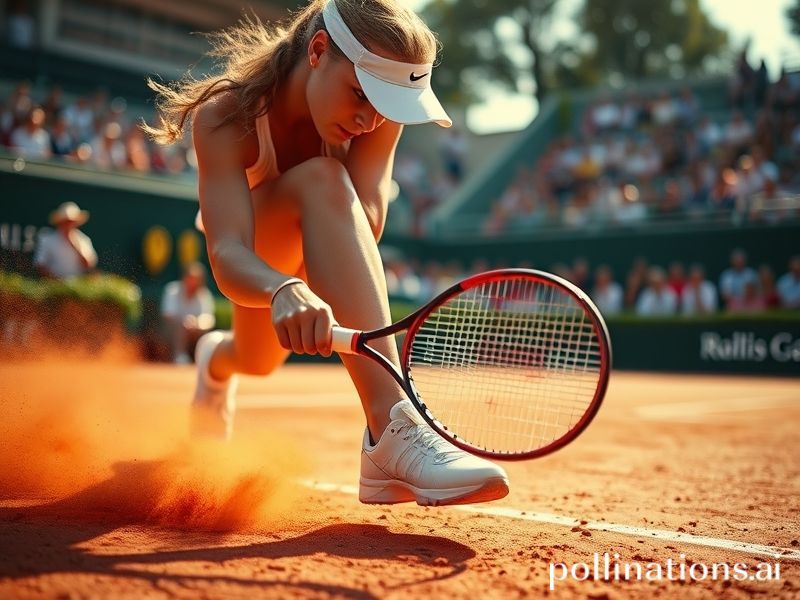Sofia Kenin’s Global Rebound: Tennis, Trauma, and the Art of Ignoring the Apocalypse
Sofia Kenin’s Comeback: A Tennis Parable for an Era That Can’t Handle a Simple Plot
By Our Correspondent, still jet-lagged from a decade that refuses to end
MELBOURNE—If you squint through the neon haze of the Australian Open’s midnight session, Sofia Kenin looks less like a former champion reclaiming her turf and more like the last guest at a party that should have ended years ago, insistently asking the DJ to replay her song. The world, meanwhile, has moved on to newer crises—crypto scams, autonomous drones, and the occasional plague—yet here she is, grinding through three-setters as though geopolitical stability depends on her backhand. Spoiler: it doesn’t, but we’ll all pretend otherwise because sport is the placebo we suck between horrors.
Kenin’s narrative arc is almost insultingly tidy: daughter of Russian émgrés washes up in Florida, learns to hit winners before she can spell “visa overstay,” captures the 2020 Australian Open while the rest of humanity stockpiled toilet paper. She was 21, the youngest American to hoist the trophy since Serena in ’02, and for five minutes the international press mistook her for the next steward of Pax Americana. Then came the pandemic, the injuries, the father-coach split so public it could have aired on Bravo, and—most unforgivable of all—rankings that slipped faster than a oligarch’s yacht re-registering under the Seychelles flag. By 2022 she was world No. 232, a number so humiliating it sounds like the waitlist for a Soviet butcher shop.
Cue 2024: Kenin re-enters the top 40, pockets a grass-court title in ’s-Hertogenbosch (a town whose name alone requires a wildcard), and suddenly foreign correspondents dust off the “American Resilience” template they keep between “Royal Baby” and “Mediterranean Migrant Tragedy.” The broader significance, we are told, is that perseverance pays off, that the human spirit is indomitable, that late capitalism hasn’t completely melted our prefrontal cortex. Sure—and Boeing promises your next door won’t detach at 16,000 feet.
Still, there is something morbidly refreshing about a storyline that doesn’t involve artificial intelligence or the phrase “pivot to video.” Kenin’s resurgence is delightingly analog: no NFT endorsements, no deepfake apology videos, just a 25-year-old woman battering yellow balls while her dad films practice sessions on an iPhone 8. In an age when even your refrigerator sells your biometric data, her regression to the mean of simple, sweaty effort feels almost subversive—like using cash, or reading past the headline.
Globally, her trajectory mirrors every middle power trying to claw back relevance after a spectacular self-own. Think post-Brexit Britain discovering it can’t actually reheat the Commonwealth like yesterday’s borscht, or Silicon Valley Bank assuring depositors that “innovation” is a sounder hedge than, say, liquidity. Kenin’s forehand isn’t going to refinance your mortgage, but her scoreline offers a rare binary clarity in a world that has forgotten how to count: win, lose, break point, repeat. No 15-dimensional chess, no cryptic tweetstorms—just a woman and her willingness to live out of a suitcase longer than most diplomats.
The geopolitical subplot, for those who crave one, is that American women’s tennis—once as dominant as U.S. cultural exports—has spent half a decade in what analysts politely term “a recalibration phase” and what cynics call “the post-Serena hangover, now with extra bourbon.” Coco Gauff can’t carry the entire hegemony on her teenage shoulders, not while climate change shortens outdoor practice seasons and college recruiters scout pickleball. Kenin’s revival therefore arrives as a sort of soft-power stimulus: proof that the empire’s farm system still produces fighters who don’t require congressional hearings to adjust their grip.
Will she win another major? The betting markets—those impartial arbiters of human hope—say “possibly,” which in 2024 translates to “don’t hold your breath unless you enjoy hypoxia.” But the broader takeaway, dear Dave’s Locker reader, is simpler: watch her matches not for geopolitical metaphor but for the exquisite discomfort of watching someone refuse to read the room. While the planet debates whether democracy is a bug or a feature, Sofia Kenin keeps sprinting after drop shots like a woman who believes history owes her a cleaner narrative. It doesn’t, but good luck telling her that. In a universe addicted to reboots, she’s the rare sequel nobody asked for yet everybody will binge, if only to remember what closure tasted like before the writers’ room went on strike.







